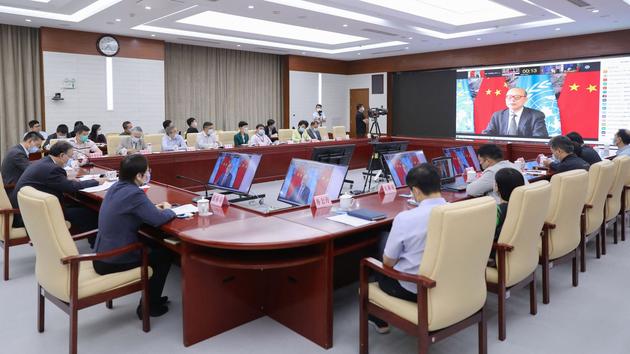To face the next pandemic, it will not be enough to
"plug the cracks"
, warned Monday Tedros Adhanom Ghebreyesus, Director General of the World Health Organization (WHO): it will be necessary
"to rebuild global health security on solid foundations, based on solidarity, equity and sustainability, ”
he insisted at the opening of the 74th meeting of the international organization, which is being held online until June 1.
“Without doubt one of the most important in the history of WHO,”
added the Director-General, whose term will end in a year.
To discover
Covid-19: vaccination as the only remedy
Read also:
Covid-19: the strange communication agency that offers influencers to discredit the Pfizer vaccine
The challenge of this World Health Assembly, which brings together delegations from around the world and constitutes the decision-making body of the WHO, is in particular to develop a better response to health emergencies while the pandemic of Covid-19 could have caused 6 to 8 million deaths (instead of the 3.4 million officially announced).
The report proposes that the WHO can investigate on the ground in the event of an epidemic outbreak without waiting for the green light from the countries concerned, which it is prohibited today
The reflection of the Member States will be informed by several evaluation reports of the response to Covid-19. One of them, released on May 12, comes from an independent group of politicians, experts and members of civil society, brought together at the request of the WHO DG, by Liberian economist and politician Ellen. Johnson Sirleaf and New Zealand Senior International Civil Servant Helen Clark. Its authors conclude that the pandemic, a
“global disaster”
, could
“have been avoided”
. They denounce in particular
"an incoherent and insufficiently funded preparation"
, a
"too slow and too modest warning system"
and
"the absence of global political leadership"
.
The authors recommend better sharing of vaccines to end the Covid, and a series of structural reforms aimed at
"ensuring that a future epidemic does not turn into a pandemic"
. Among them: strengthening the authority and independence of the WHO, and setting up a new monitoring system based on
"the total transparency of all parties"
. The report proposes that the WHO can investigate on the ground in the event of an epidemic outbreak without waiting for the green light from the countries concerned, which it is prohibited today. It took several months of discussions with China for a team of scientists, appointed with Beijing's agreement, to go there to investigate the origin of the Covid.
"We must give real inspection power to the WHO, as we have given to international organizations responsible for the application of nuclear or chemical treaties
," comments Antoine Flahault, professor of public health at the University of Geneva.
China and Russia seem to be very reluctant to these inspections on their soil.
This assembly will be for them an hour of truth in the face of the world. ”
Preventing, detecting, responding to epidemics does not happen in Geneva, New York or in the corridors of power
Tedros Adhanom Ghebreyesus, Director-General of WHO
Experts are also asking for an increase in the WHO budget (today equivalent to that of a French university hospital, according to Antoine Flahault) and a real delegation, by the Member States, of their health prerogatives - which most refuse to give up.
"WHO must be the heart, the compass of our global health",
declared Emmanuel Macron in his speech, calling for an organization
"robust in times of crisis, sufficiently agile to react urgently, solid in the face of controversies, completely transparent to inspire confidence, with clear and transparent governance to avoid any diplomatic pressure ”
. The Head of State announced the creation in Lyon in 2023 of a World Health Academy, a future public health training structure. According to the WHO, the need is immense: there will be a shortage of 18 million health workers by 2030, especially in the less wealthy countries.
"Preventing, detecting, responding to epidemics is not done in Geneva, New York or in the corridors of power"
, insisted the Director General of WHO, but locally thanks to
"strong care systems"
, linked by a global chain of early warning and rapid response.
The origin of the virus, still so mysterious
The mystery of the origins of Sars-CoV-2 remains unresolved and, according to the head of the WHO, who dispatched a mission to the site between January 14 and February 10, new investigations are to be expected.
More and more scientists are also urging China to be more transparent.
Last significant fact, a letter published in the journal Science on May 13 and signed by the greatest specialists in the subject called for examining the hypothesis of a laboratory leak in the same way as that of "zoonotic overflow".
Whether or not this is a first step, researchers at the Wuhan Institute of Virology (WIV) published on May 21 the genetic sequences of eight new coronaviruses taken from the disused mine of Mojiang. It was in this mine that RaTG13, a bat virus and the closest relative of Sars-CoV-2, was unearthed. The scientific community has known the existence of these eight viruses since November 2020, without ever having been able to analyze their genome and their possible link with Sars-CoV-2. WHO experts also had no access to this information and were unable to visit the site. “These sequences will be very useful for reconstructing the evolutionary history of the sequence of the virus which led to Sars-CoV-2, judge Virginie Courtier, biologist at the Jacques Monod Institute (Paris).Although the effort of transparency is not ideal. ” For example, the total genome of the 8 viruses has been published only in the Chinese database and not yet in the international sequence database. If there is a first step, it remains measured.

